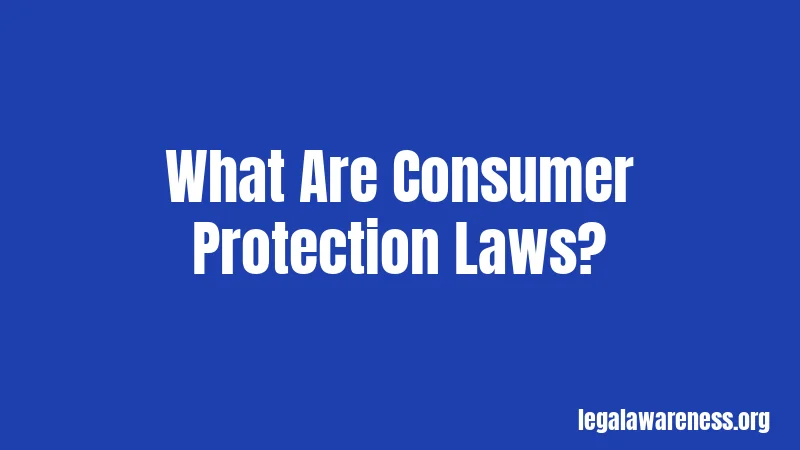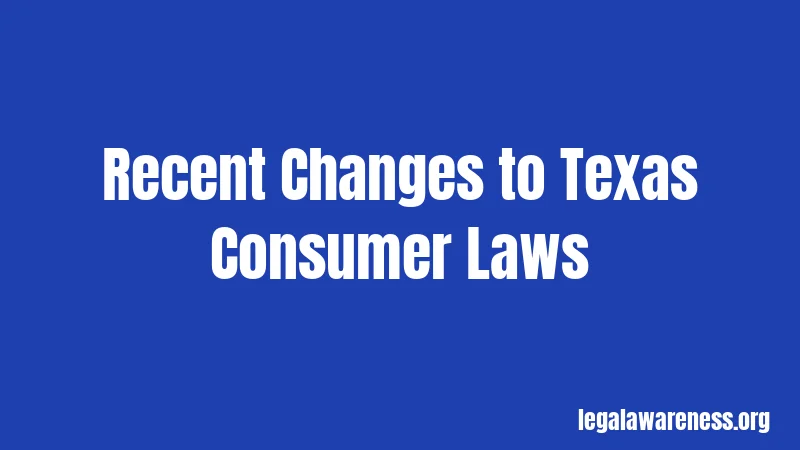Consumer Laws in Texas (2026): Your Protection Guide
Most people have no idea how much protection they actually have. Seriously. Texas consumer laws are some of the strongest in the country, but hardly anyone knows about them. If you’ve ever been scammed, gotten a lemon car, or dealt with shady business practices, you need to know your rights.
Let’s break down exactly what Texas law does to protect you.
What Are Consumer Protection Laws?

Consumer protection laws exist to keep businesses honest. They stop companies from lying to you, selling you broken products, or using sneaky tactics to take your money.
Think of it like a safety net. When businesses play dirty, these laws give you a way to fight back.
In Texas, the main law protecting consumers is called the Deceptive Trade Practices Act. It’s been around since the 1970s. Honestly, it’s probably the most important consumer law you’ve never heard of.
The Texas Deceptive Trade Practices Act (DTPA)
Here’s the deal. The DTPA is your shield against dishonest businesses.
This law is broad. Really broad. It covers everything from car sales to home repairs to online shopping. If a business lies to you or hides important information, they’re breaking the law.
What Counts as a Deceptive Practice?
The law lists 27 specific things businesses can’t do. These include:
Lying about what a product can do. Passing off goods as something they’re not. Advertising products they don’t actually have. Saying something is “new” when it’s used or refurbished. Claiming a price is “reduced” when it never was higher.
Not sure what counts as a violation? Let me break it down.
If a business tells you something false to get you to buy, that’s a violation. If they hide known defects to trick you into a purchase, that’s also illegal. Even silence can be a violation if they knew about problems and didn’t tell you.
Who Can Sue Under the DTPA?
You have to be a “consumer” to use this law. That means you’re an individual, partnership, corporation, or even a government entity buying goods or services.
Pretty much everyone counts as a consumer. If you bought or leased something for personal, family, or business use, you qualify.
What Can You Win?
Okay, this one’s important. The penalties for businesses that break this law are serious.
If you win your case, you could get:
Up to three times your actual damages. Money for mental anguish. All your court costs and attorney fees.
Yep, that’s right. If a business knowingly ripped you off, a court can triple your damages. A $3,000 loss could become a $9,000 award.
Hold on, this part is important. To get triple damages, you need to prove the business “knowingly” violated the law. That means they knew what they were doing was wrong.
Recent Changes to Texas Consumer Laws

Texas lawmakers have been busy. Several major updates took effect in 2025, and more are coming in 2026.
New Telemarketing Rules (Effective September 2025)
Remember all those spam texts and robocalls? Texas just made them way more expensive for businesses.
Senate Bill 140 changed everything. This law went into effect on September 1, 2025. It dramatically expanded what counts as illegal telemarketing.
Here’s what changed:
Text messages now count as “telephone solicitation.” Images and other digital messages are covered too. Businesses can face $500 to $5,000 per violation. You can sue directly without going through state agencies first.
Wait, it gets better. These violations also trigger the DTPA. That means treble damages and mandatory attorney fees on top of the base penalties.
A single spam text could cost a business over $15,000 if they lose in court. Seriously.
Data Privacy Protections (Effective July 2024)
The Texas Data Privacy and Security Act started on July 1, 2024. New provisions kicked in on January 1, 2025.
This law protects your personal information. It applies to most businesses operating in Texas, except small businesses with fewer than 500 employees.
Companies must:
Tell you what data they collect. Let you see your data. Delete your data if you ask. Stop selling your data if you opt out.
Confused about the difference? Let me break it down. This law is about your digital privacy. The DTPA is about deceptive business practices. They work together to protect you.
The Texas Lemon Law
Got a car that won’t stop breaking down? The Lemon Law might help.
This law covers new vehicles with serious defects. We’re talking cars, trucks, motorcycles, RVs, and even ATVs. If your new ride is a dud, Texas law requires the manufacturer to fix it, replace it, or buy it back.
What Makes a Car a “Lemon”?
Your vehicle needs to meet specific criteria. You can’t just call any broken car a lemon.
The defect must be substantial. It has to affect the vehicle’s use, value, or safety. Minor issues like radio static don’t count.
The problem must be covered by the manufacturer’s warranty. You need to report the defect during the warranty period.
And here’s the kicker. The dealer or manufacturer must have had a “reasonable” number of chances to fix it.
The Reasonable Repair Test
Texas uses three tests to determine if you gave them enough chances:
Four-Times Test: The same problem exists after four repair attempts within the first 24 months or 24,000 miles.
Safety Hazard Test: A serious safety issue wasn’t fixed after two repair attempts within the first 24 months or 24,000 miles.
30-Day Test: Your vehicle was out of service for repairs for 30 or more days (not necessarily consecutive) within the first 24 months or 24,000 miles.
Meet any one of these? Your car might be a lemon.
What Relief Can You Get?
The manufacturer has three options:
They can buy back your vehicle. You get a refund of the purchase price minus a deduction for the miles you drove. They can replace your vehicle with a comparable one. They can actually fix the defect.
You might also get reimbursed for out-of-pocket repair costs that should have been covered by warranty.
How to File a Lemon Law Claim
You file your complaint with the Texas Department of Motor Vehicles. The filing fee is $35.
But wait. You only have six months to file after whichever comes first:
Your warranty expires. 24 months after you bought the vehicle. 24,000 miles on the odometer.
Don’t wait around. File as soon as you realize they can’t fix your car.
Consumer Rights with Used Cars

Used cars get less protection, but you’re not completely out of luck.
The Lemon Law mostly applies to new vehicles. However, if your used car is still under the original manufacturer’s warranty, you might be covered.
Sound complicated? It’s actually not. If you bought a used car “as-is” with no warranty, the Lemon Law won’t help you. But the DTPA might.
The DTPA and Used Cars
The Deceptive Trade Practices Act protects used car buyers too. If the dealer:
Lied about the car’s condition. Hid known defects. Rolled back the odometer. Made false promises.
You can sue under the DTPA. You’re not alone, this confuses a lot of people. The Lemon Law and DTPA are different tools. Use whichever one fits your situation.
How to Protect Yourself
Most people don’t realize how strict these laws are. Here’s what you should do.
Get Everything in Writing
Verbal promises don’t mean much in court. Make sure warranties, guarantees, and agreements are written down.
Keep every receipt. Save all repair records. Document every conversation.
Trust me, this works. These records become evidence if you need to file a claim.
Know the 60-Day Notice Rule
Before you can sue under the DTPA, you must give the business 60 days’ written notice. This is required.
Your notice should include:
What went wrong. Which specific DTPA violations apply. How much money you lost. A statement that you’ll sue if they don’t fix the problem within 60 days.
Many businesses settle during this 60-day period. They know triple damages are possible if they lose in court.
File Complaints with the Right Agency
You have options beyond filing a lawsuit.
The Texas Attorney General’s Consumer Protection Division accepts complaints. They can’t represent you individually, but they investigate violations. If enough people complain about the same business, the AG might take action.
You can also file complaints with:
The Federal Trade Commission. The Consumer Financial Protection Bureau. The Office of Consumer Credit Commissioner (for certain lenders).
These agencies track patterns of abuse. Your complaint helps protect others.
Special Protections for Specific Situations
Texas has additional laws for particular consumer issues.
Warranty Law
All products sold in Texas come with implied warranties. Even if nothing is written down, the law assumes:
The product will work for its intended purpose. The product is fit for sale.
These are called the “implied warranty of merchantability” and “implied warranty of fitness.”
Businesses can’t just say “no warranty” and escape responsibility. The DTPA protects warranty rights.
Home Repair Scams
Contractors who do shoddy work or abandon jobs violate the DTPA. This is especially common after natural disasters.
Be wary of contractors who:
Demand full payment upfront. Pressure you to sign immediately. Don’t have proper licenses or insurance. Can’t provide local references.
You have the right to a written contract. You have the right to see proof of insurance.
Credit and Debt Collection
Texas law limits what debt collectors can do. They can’t:
Call you before 8 AM or after 9 PM. Contact you at work if you tell them not to. Harass or threaten you. Lie about how much you owe.
Debt collectors who break these rules violate federal law and might violate the DTPA too.
Penalties and Enforcement
Now, here’s where things get serious.
Private Lawsuits
You can sue businesses directly under the DTPA. You don’t need to wait for the government to act.
If you win, the court can order:
Economic damages (your actual losses). Three times your damages if the violation was knowing or intentional. Damages for mental anguish. Attorney fees and court costs.
The attorney fee provision is huge. It means lawyers will take DTPA cases on contingency. You might not need money upfront to hire a lawyer.
Government Enforcement
The Attorney General can also sue businesses that violate consumer protection laws. When the AG wins, businesses can face:
Civil penalties up to $10,000 per violation. Injunctions ordering them to stop illegal practices. Consumer restitution.
For businesses with many violations, penalties add up fast. A company that sent illegal spam texts to 1,000 people could face $10 million in potential fines.
Recent Enforcement Actions
The Texas AG has been aggressive lately. In 2024 and 2025, major cases included:
Investigations into food companies for misleading health claims. Lawsuits against AI companies for data privacy violations. Actions against data brokers for violating privacy laws. Cases against telemarketing companies for illegal calls and texts.
This part can be tricky, honestly. The AG is using the DTPA in new ways to enforce data privacy and AI regulations.
Statute of Limitations
Wondering if this applies to you? You need to act fast.
You generally have two years from when you discovered (or should have discovered) the violation to file a DTPA lawsuit. Don’t worry, we’ll break it down step by step.
Some violations are hidden or hard to detect. For those, the clock starts when you discover the problem, not when it happened.
If the business deliberately delayed you from filing suit, you might get an extra 180 days. But don’t count on it.
Here’s my advice: Make your complaint right away when something goes wrong. If the business doesn’t fix it quickly, talk to a lawyer immediately.
What to Do If You’re a Victim
You’re not alone, this happens to thousands of Texans every year. Follow these steps.
Step 1: Document Everything
Write down what happened. Include dates, names, and exactly what was said or done. Gather all receipts, contracts, emails, and text messages.
Take photos or videos if relevant. The more evidence you have, the stronger your case.
Step 2: Contact the Business
Give them a chance to make it right. Sometimes businesses fix problems when you point them out.
Send a written complaint. Keep a copy for yourself. Use certified mail so you have proof they received it.
Step 3: Send the Required 60-Day Notice
If they don’t fix the problem, send your formal DTPA notice. Remember, this is required before you can sue.
Step 4: File Complaints with Agencies
While waiting out the 60 days, file complaints with:
Texas Attorney General. Federal Trade Commission. Better Business Bureau.
These complaints create a record. They might prompt an investigation.
Step 5: Consult a Lawyer
Many consumer protection attorneys offer free consultations. They’ll tell you if you have a case.
Because the DTPA requires businesses to pay your attorney fees if you win, lawyers often work on contingency. You pay nothing unless you win.
Frequently Asked Questions
Can I sue a business for lying about a product?
Yes. False advertising and deceptive statements violate the DTPA. You can sue if you relied on the lie and it caused you financial harm.
How much does it cost to file a DTPA lawsuit?
Many attorneys take DTPA cases on contingency because the law requires losing businesses to pay attorney fees. This means you might pay nothing upfront. Small claims court (for damages under $20,000) is another low-cost option.
What if I signed a contract saying I can’t sue?
Some contract provisions trying to waive DTPA rights are unenforceable. Talk to a lawyer. You might still have a valid claim.
Does the DTPA cover online purchases?
Yes. Online businesses selling to Texas consumers must follow Texas law. The DTPA applies to internet transactions, though enforcement can be harder against out-of-state companies.
Can businesses get in trouble for spam texts now?
Absolutely. Since September 1, 2025, unauthorized marketing texts can trigger penalties of $500 to $5,000 per message plus DTPA damages. Businesses are facing significant liability for spam texts.
Final Thoughts
Texas consumer protection laws are strong. Really strong. But they only work if you know about them and use them.
Don’t let businesses take advantage of you. Document problems, send required notices, file complaints, and consult lawyers when needed.
The DTPA, Lemon Law, and other protections exist to level the playing field. You have rights. Use them.
Stay informed, keep records, and when in doubt, get legal advice. Most consultations are free, and you might have more options than you think.
References
- Texas Business & Commerce Code, Chapter 17 (Deceptive Trade Practices Act) – https://statutes.capitol.texas.gov/Docs/BC/htm/BC.17.htm
- Texas Attorney General Consumer Protection Division – https://www.texasattorneygeneral.gov/consumer-protection
- Texas Department of Motor Vehicles – Lemon Law Information – https://www.txdmv.gov/motorists/consumer-protection/lemon-law
- Texas Occupations Code, Chapter 2301 (Texas Lemon Law) – https://statutes.capitol.texas.gov/Docs/OC/htm/OC.2301.htm
- Texas State Law Library – Consumer Protection Guide – https://guides.sll.texas.gov/consumer-protection
- Texas Business & Commerce Code, Chapter 541 (Texas Data Privacy and Security Act) – https://capitol.texas.gov/tlodocs/88R/billtext/html/HB00004F.htm
- Senate Bill 140 (Texas Telemarketing Amendments, 2025) – https://capitol.texas.gov/tlodocs/89R/billtext/html/SB00140F.htm
